Although Elvis Duran feels like sitting in an “electric chair” every morning, his heart for radio will never stop. “I will die while giving the time on a radio station.”
The breakfast show masterclass where Keith Pringle interviewed Elvis Duran and Dennis Clark, was the best session of the outstanding Radio Festival 2011. In this part: morning show radio production, including how to coach callers. And if you want to be successful, learn to know and love yourself. “You’ve got to let yourself off the hook and trust you!”
“It’s paramount to have callers on”
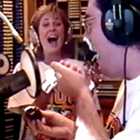 Think like a producer
Think like a producer
As a fan of US Top 40 radio, I’d already seen it many times – the Art Vuolo video aircheck of Elvis Duran doing afternoon drive on Z100. Remember the on-air cake fight with Valerie Segraves (photo) at the 8th year birthday party of Z100? Another cool scene is where we see him coaching a caller who’s won a contest. Elvis clearly thinks like a producer while building the bit. Listen to how the following call is being produced:
[audio:http://www.radioiloveit.com/wp-content/uploads/elvis-duran-morning-show-radio-personality-z100-radio-festival-manchester-2011-recording-thomas-giger-5.mp3|titles=elvis-duran-morning-show-radio-personality-z100-radio-festival-manchester-2011-recording-thomas-giger-5]
See the big picture
What makes someone a good producer? “Someone who can read my mind and anticipate my next move. It’s a relationship. You have to depend on them, and they have to depend on you.” Dennis Clark thinks that “the producer needs to have a bigger picture of the show than the host does and be prepared to take the show into different directions at any time.” Also, a producer should know his or her place: “Talent is fantastic. Let them do their job.” The team around Duran includes many young people, which helps to stay close to the target listener (a 24-year-old female).
 Make phone calls exciting
Make phone calls exciting
Elvis Duran And The Morning Show is known for its Phone Taps, which have become a popular benchmark over the years. They did thousands of them by now. Most of the time however, calls are about real life stories told by listeners. Some of them are really open, which can lead to conversations ‘on the edge’. But taking chances can also create radio that listeners can’t turn off because you want to hear what they’ll say next. Here’s an example:
[audio:http://www.radioiloveit.com/wp-content/uploads/elvis-duran-morning-show-radio-personality-z100-radio-festival-manchester-2011-recording-thomas-giger-6.mp3|titles=elvis-duran-morning-show-radio-personality-z100-radio-festival-manchester-2011-recording-thomas-giger-6]
Coach callers before airtime
Why do listeners share intimate details about their life? Elvis Duran: “People become comfortable with us. Plus, they’re on the phone – so they can get away with saying awful things sometimes. God bless ‘em. How boring would it be to not have communication with the outside world? It’s paramount to have callers on, but you need someone who knows who to put through. Coaching callers is the most important thing you can do. They are listeners, not radio people. If you put ’em through without coaching, it’s gonna’ fail.”
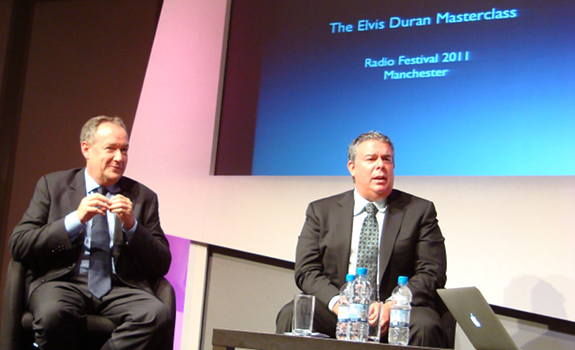
Dennis Clark and Elvis Duran talk about the importance of screening and coaching callers (photo: Thomas Giger)
Anticipate to listener response
Dennis Clark, executive producer of On-Air With Ryan Seacrest, says that there are four producers standing by to answer the phones for that show. “When the phones are hot, you have to get that moment.” It’s also essential to not let people tell the whole story to the producer, but to keep the best part for the program while it’s still fresh. Elvis Duran reveals that his show is broadcast on a delay (21 seconds, in some markets 45) so “if you introduce a thought, you want someone to call immediately, but it’s not gonna’ happen”.
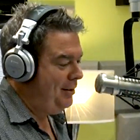 Get to the point
Get to the point
Duran helps callers to get to the point as soon as possible, to create a compelling listener experience. How does he trigger people to share interesting stories in front of a live audience of millions? Simple, but true: “You just have to ask the right questions. If you don’t listen to what they say, then you really don’t know where to take them on their journey.” Elvis then explains how to turn a bad starting conversation into anything you want easily:
[audio:http://www.radioiloveit.com/wp-content/uploads/elvis-duran-morning-show-radio-personality-z100-radio-festival-manchester-2011-recording-thomas-giger-7.mp3|titles=elvis-duran-morning-show-radio-personality-z100-radio-festival-manchester-2011-recording-thomas-giger-7]
“Don’t be afraid to let people hear
what’s in your heart”
 Show listeners your emotions
Show listeners your emotions
Terry Underhill of UTV Radio would like to know how Elvis experienced difficult morning shows, like the day after the September 11, 2001. “I must be honest. Those are the easiest ones. Keeping it fun all the time is hard work. When something like 9/11 happens before your eyes and you see the pain it causes people, that’s easy to talk about. You just have to do it and don’t be afraid to let people hear what’s in your heart.”
[audio:http://www.radioiloveit.com/wp-content/uploads/elvis-duran-morning-show-radio-personality-z100-radio-festival-manchester-2011-recording-thomas-giger-8.mp3|titles=elvis-duran-morning-show-radio-personality-z100-radio-festival-manchester-2011-recording-thomas-giger-8]
“I’m so fucking mad on myself
for waiting so late in life to trust myself”
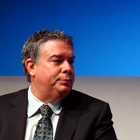 Become more self-confident
Become more self-confident
Elvis Duran talks openly about his lack of self-confidence when he just started out. His story makes clear what it’s all about. Being yourself is what connects you to your audience. It’s evident that getting to know and learning to love yourself is part of growing into a true (radio) personality. “I learned to trust myself about ten years ago, and that’s when our ratings started to take off.” Take a minute to listen to this:
[audio:http://www.radioiloveit.com/wp-content/uploads/elvis-duran-morning-show-radio-personality-z100-radio-festival-manchester-2011-recording-thomas-giger-9.mp3|titles=elvis-duran-morning-show-radio-personality-z100-radio-festival-manchester-2011-recording-thomas-giger-9]
Care about your audience
“My father is a funny Scottish guy, who loves a good drink and a good joke. He always tries to be positive; find the good things in life. My mother was very proper and tried to teach me manners. They taught in our household: do not be afraid to tell someone you love them; do not be afraid to take care of someone. Make them feel wanted, make them feel loved.” He wants to give this to his listeners as well. “God knows what they’re going through in their lives. Maybe they have weight issues, love issues or money issues. As long as you make them feel like you give a damn, they see you’re a caring person.”
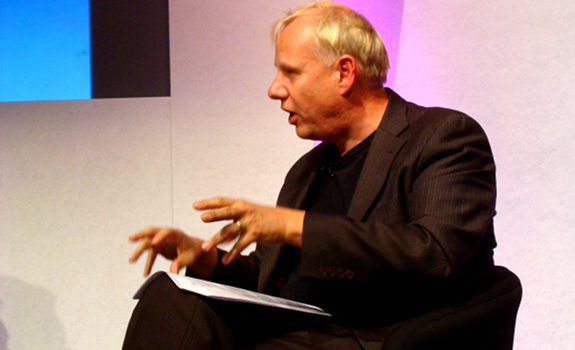
Interviewer Keith Pringle also works as a consultant for Elvis Duran And The Morning Show (photo: Thomas Giger)
Offer several different views
Elvis Duran And The Morning Show has many cast members. Danny Oakes from the Capital FM Yorkshire breakfast show is asking if it’s not difficult for (new) listeners to separate all these voices? “I love having all these different opinions walk through. I need it. I think the show needs it. But it is confusing, even for people who listen for years”, Duran admits. They usually let people hear a balanced conversation, though. “We try not to talk over each other.” Still, becoming popular in a new market is not a short-term thing.
“I’m a real jerk between 5 and 10 –
at 10 o’clock, I’m a pussycat”
Aim for long-term success
Listeners need time to identify themselves with the many characters. “It takes a year for a show of this size to get ratings. But with all these different crazy, whacked out personalities we leave a deeper footprint in the long run. I think that’s they key to our success.” Dennis Clark adds that the main question is if everybody on the show contributes something unique to it. Research shows that listeners feel there are a lot of people on the show and don’t know everybody. But they know the core people in the middle, and they like the fun.
Use relevant radio practices
Elvis Duran and Dennis Clark comment on whether some classic radio rules are still important or not to create a successful morning show or personality radio program:
Telling the time
- Elvis: “It’s right there, on your mobile phone”
- Dennis: “I’d rather spend time saying your name”
Keeping to the clock
- Elvis, with great timing: “I’m told it’s important” (audience laughs and applauds)
- Dennis, with dry humor: “It’s very important” (hilarious atmosphere again)
Sounding like a fan of the music
- Elvis: “Why would you do anything unless you’re a fan of it?”
- Dennis: “It’s even bigger than important; it’s crucial”
Teasing what’s coming next in content
- Elvis: “No, unless it’s a big guest coming up”
- Dennis: “Make sure that what you’re teasing is something absolutely interesting”
Producing one show for one market, rather than a syndicated show for many markets
- Elvis: “We do local breaks select markets, but for many we don’t – we’re more universal; make a show that’s fun and entertaining”
- Dennis: “I like the ‘I live here too’ stuff, but if you know who your target is, they’ll find you – focus on the listener”
Keep your focus constantly
Elvis Duran says that presenting the morning show feels like “sitting in an electric chair” that has been switched on. “I become a complete asshole. If someone’s not on my path behind me, I get mad and irritated. I’m a real jerk between 5 and 10. At 10 o’clock, I’m a pussycat. It’s just the intensity of that show. People say to you: oh, you have four hours and have the rest of the day to go play. You go on the radio and play a couple of songs? Oh, those assholes!”, he jokes. “Seriously. It’s an intensity factory in there.”
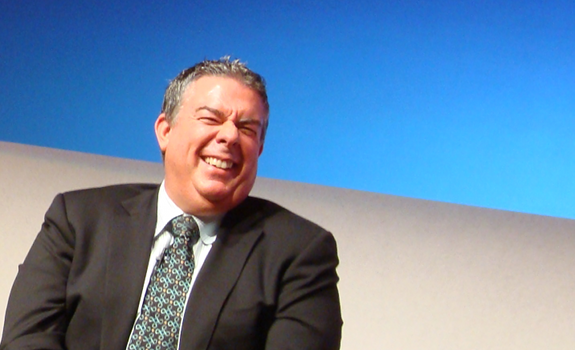
Duran about retiring on AC: “Talking about farts and playing The Carpenters? I don’t know.” (photo: Thomas Giger)
Quit on the top
“I never want to be there because of my years of service. I want to be there because I’m relevant. I think I have a couple of more years left in me. I’m almost there, at least for this CHR format. You can leave and still be on top. It will be the hardest day of my life, when they retire me on Adult Contemporary stations. Talking about farts and playing The Carpenters? I don’t know. But I was seduced by radio at a very young age, and I plan on being there as long as I can. I will die while giving the time on a radio station.”
Read also:
- Elvis Duran About Personality Radio: “Let It All Out”
- Elvis Duran: American Radio’s Jerry Seinfeld
- Interview Elvis Duran: “I’m Just Into My Own Thing”
Stay tuned, follow us: @RadioILOVEIT





Add Your Comment